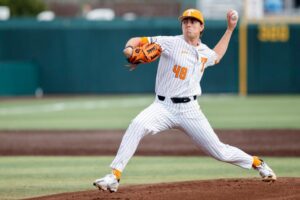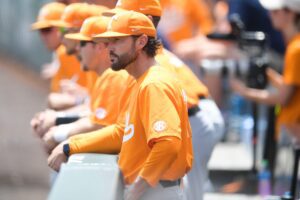Vol quarterbacks who have started as a true freshman
This Saturday, Josh Dobbs will replace an injured Justin Worley to become the ninth true freshman to start at quarterback for Tennessee. Tennessee has had a good track record with freshman quarterbacks, with several going on to distinguish themselves in Vol football lore. Here is a look at the debuts for these quarterbacks, as well as how the season and the career of each player turned out.
Alan Cockrell (1981)- Cockrell came to Tennessee as a two-sport star, playing both baseball and football. The Vols started out the 1981 season quite poorly, going o-2 out of the gate with a 44-0 loss to Herschel Walker and Georgia and a 43-7 loss to Marcus Allen and USC (ironically, Allen was the 1981 Heisman winner and Walker won in 1982). Coach Johnny Majors turned to Alan Cockrell to start the next game against Colorado State. Cockrell was able to get the team back on track, going 7-14 for 74 yards with two rushing touchdowns to go with an interception in a 42-0 Tennessee victory. Cockrell did not play much the rest of the season, completing only 15 passes in 31 attempts for 119 yards, a touchdown, and two interceptions as the Vols went 8-4. He was the full-time starter in 1982 and 1983 though, finishing his career with 3,823 yards passing and 26 touchdowns (not to mention two big wins over Alabama) before foregoing his senior season to pursue a baseball career.
Peyton Manning (1994)- Manning surprised many by choosing Tennessee over his father Archie’s alma mater Ole Miss. He didn’t figure to play much his freshman year, as senior Jerry Colquitt had sat behind Andy Kelly and Heath Shuler until he finally got his chance to start. Unfortunately for Colquitt, he went down on the first drive of the season against UCLA and missed the rest of the year. Future MLB great Todd Helton was next on the depth chart, though Manning and fellow freshman Branndon Stewart also got playing time. Helton later went down with a season-ending injury against Mississippi State, leaving Manning and Stewart to split time. Manning went 14-23 for 256 and two touchdowns in a loss that dropped Tennessee to 1-3. Manning’s first start came against 19th-ranked Washington State on homecoming. His stats were meager, going only 7-14 for 79 yards with no touchdowns, but he earned a 10-9 victory and eventually cemented himself as the starter (Stewart later transferred to Texas A&M, where he beat an undefeated Kansas State in the Big 12 Championship to deny the Wildcats a chance to play Tennessee in the 1998 BCS National Championship). Manning finished his freshman season with 1,141 yards passing and 11 touchdowns, leading Tennessee to an 8-4 record and going on to become the school’s all-time leading passer with 11,201 yards and 89 touchdowns.
Casey Clausen (2000)- The 2000 season started out with great uncertainty. Gone were many of the core players from a team that went 22-3 in 1998 and 1999. One of the biggest losses was quarterback Tee Martin, who finished his career with the highest winning percentage of any UT quarterback. Clausen was likely going to be named the starter for the 2000 season opener, but an injury suffered in camp prevented that. The Vols struggled to a 2-3 record to start the season, and neither Joey Matthews nor A.J. Suggs could get the job done. Clausen had only played sparingly in that 2-3 start, but he earned his first career start against an Alabama team that was coming off an SEC championship (however, the Tide only went 3-8 in 2000). Clausen was exceptional, going 17-24 for 213 yards and two touchdowns in a 20-10 victory. “The Iceman” went on to win every game the rest of the regular season before falling to Kansas State in the Cotton Bowl, and the team finished 8-4. He threw for 1,473 yards and 15 touchdowns as a freshman and went on to throw for 9,707 yards and 75 touchdowns in his career.
James Banks (2002)- The 2002 season was a disappointing one for Tennessee. They were a popular pick to go to the national championship after going 11-2 the year prior, but things never got rolling, and the roster was obliterated with injuries. One of those who missed time was Clausen. Clausen was hurt prior to the Georgia game, so C.J. Leak got the start. Leak (former Florida quarterback Chris’s older brother) was ineffective, and the Vols got behind 16-0 before Fulmer turned to Banks. Banks was a five-star recruit out of Indianapolis who could do just about anything on a football field, and he provided the offense with a spark, going 10-15 for 158 yards and a touchdown in a game the Vols lost 16-13. That performance elevated him to second-string, and when Clausen went down later in the season, Banks got the start against Mississippi State. Banks was only 3-8 in the game, but those three completions went for 90 yards and a touchdown in a 35-17 Volunteer win. Banks was moved to receiver in 2003 and led the team in yards with 621 and tied for the team lead in receiving touchdowns with six. In 2004, there were plans to move Banks again, this time to safety, before he was kicked off the team.
Brent Schaeffer/Erik Ainge (2004)- After Casey Clausen graduated, many figured the quarterback battle would be between Leak and Casey’s younger brother Rick. But when the freshman class got on campus, Schaeffer and Ainge outperformed them. They were named co-starters for the season opener against UNLV (the only time a true freshman has started the season opener for the Vols), but Schaeffer took the first snap. Schaeffer was a mobile lefty that reminded some of Michael Vick (he even wore number seven), while Ainge, the nephew of former NBA star Danny Ainge, was a more prototypical dropback passer. Schaeffer went 7-10 for 123 yards passing and accounted for two touchdowns, one through the air and one on the ground. Ainge went 10-17 for 118 yards and two passing touchdowns in a 42-17 win. Schaeffer also took the first snap against Florida and played pretty well, going 3-4 for 40 yards through the air and adding another 38 on the ground, but Ainge led the Vols to the victory. He went 16-24 with 192 yards and three touchdowns in a 30-28 win, including a late drive that set up the winning field goal. Ainge got his first true start against Auburn, but he played miserably, going 17-35 for 173 yards and a touchdown with four picks, losing 34-10. Ainge got the bulk of the time moving forward. Schaeffer got hurt against South Carolina and would not be healthy until the Cotton Bowl, and Ainge was knocked out for the duration of the season against Notre Dame. Rick Clausen finished the season, and the Vols went 10-3 with an appearance in the SEC Championship game. Schaeffer finished the year 18-37 for 302 yards and two touchdowns passing, but he was kicked off the team in the offseason. Ainge threw for 1,452 yards and 17 touchdowns on the season and finished his career with 8,700 passing yards and 72 passing touchdowns.
Tyler Bray (2010)- 2010 was the first year for Derek Dooley, and the year started out rough with a 2-6 mark. Matt Simms started the first eight games, but was pulled after fumbling twice against South Carolina. Simms had been throwing well, going 10-13 for 153 yards and a touchdown, but Bray got his chance. He kept the Vols in the game, going 9-15 for 159 yards, two touchdowns, and an interception, but the Vols lost 38-24. Bray got the opportunity to finish the season and earned his first career start versus Memphis. He was 19-33 for 325 yards and five touchdowns in a 50-14 win. He finished the regular season 4-0 and helped the Vols reach the Music City Bowl against North Carolina, the last time Tennessee has reached a bowl game. Bray’s last two seasons as a Vol did not go as hoped, but he finished among Tennessee’s all-time leading passers with 7,444 yards and 69 touchdowns.
Justin Worley (2011)- Worley was not expected to play much if at all as a freshman, as Bray and Simms were ahead of him on the depth chart. Bray broke his thumb against Georgia, and Simms came to fill in. After a blowout loss against LSU, Dooley pulled Simms during a blowout against Alabama in favor of Worley. Worley did not attempt a pass, but he did get the start in the next game against his home state school, South Carolina. He went 10-26 for 105 yards and two interceptions in a 13-3 loss. He started the next two games before Bray came back to for the last two games. The team went 5-7, losing to Kentucky in the final game. Worley went 48-87 with one touchdown, three picks, and 604 yards on the year. In his career to date, he has thrown for 1,977 yards and 11 touchdowns.



